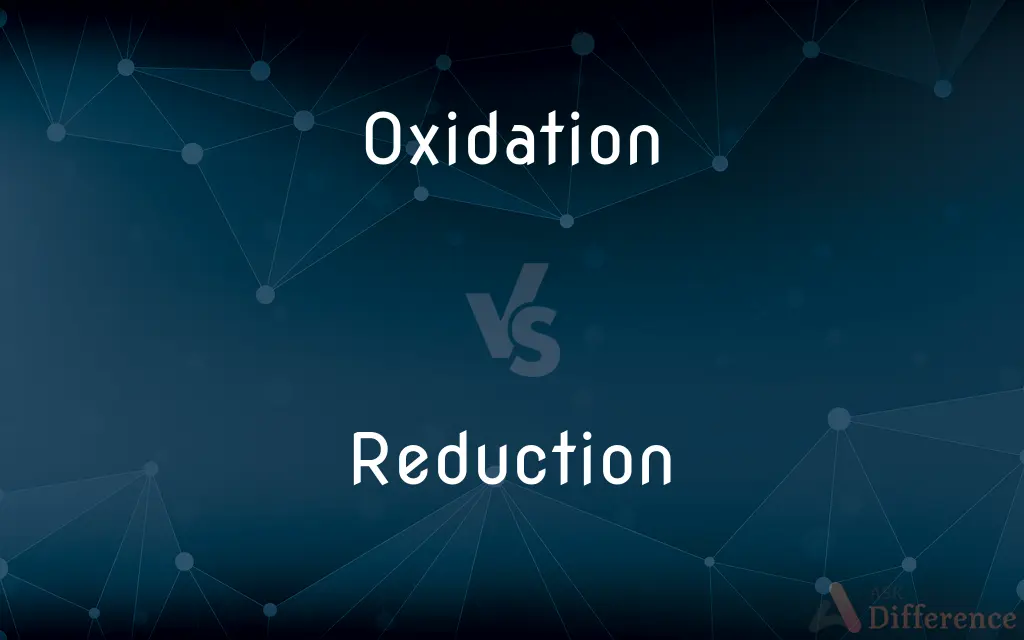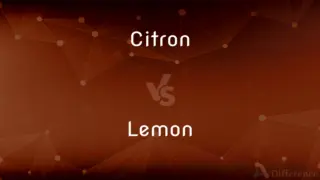Oxidation vs. Reduction — What's the Difference?
By Fiza Rafique & Maham Liaqat — Updated on March 25, 2024
Oxidation involves the loss of electrons or increase in oxidation state by a molecule, atom, or ion, while reduction involves the gain of electrons or decrease in oxidation state.

Difference Between Oxidation and Reduction
Table of Contents
ADVERTISEMENT
Key Differences
Oxidation is a chemical reaction where a substance loses electrons, leading to an increase in its oxidation state. This process is crucial in various chemical reactions, including combustion and metabolism. Reduction, on the other hand, occurs when a substance gains electrons, resulting in a decrease in its oxidation state. It plays a key role in energy production and biochemical processes.
In the context of redox reactions, which encompass both oxidation and reduction processes, oxidation and reduction always occur simultaneously. When one substance is oxidized, losing electrons, another substance undergoes reduction, gaining those electrons. This interdependence is fundamental to understanding chemical reactions and is summarized by the mnemonic "LEO says GER" (Lose Electrons Oxidation, Gain Electrons Reduction).
The practical applications of oxidation and reduction are widespread and significant. Oxidation processes are involved in the rusting of metals and the burning of fuels, which are crucial to various industrial operations. Reduction reactions are essential in metallurgical processes, such as the extraction of metals from their ores, and in chemical synthesis, where compounds are reduced to form new substances.
Oxidizing and reducing agents are substances that facilitate oxidation and reduction, respectively. An oxidizing agent gains electrons and is reduced in the process, while a reducing agent loses electrons and is oxidized. Identifying these agents is key to understanding and controlling chemical reactions, especially in industrial and laboratory settings.
The concept of oxidation states is instrumental in tracking the transfer of electrons in chemical reactions. An oxidation state, or oxidation number, is a theoretical charge that an atom would have if all bonds to atoms of different elements were completely ionic. Changes in oxidation states during a reaction indicate the movement of electrons and the occurrence of oxidation and reduction.
ADVERTISEMENT
Comparison Chart
Electron Movement
Loss of electrons
Gain of electrons
Oxidation State
Increases
Decreases
Process
Substance is oxidized
Substance is reduced
Chemical Reactions
Rusting of metals, burning of fuels
Extraction of metals, chemical synthesis
Role in Redox Reaction
Provides electrons (reducing agent)
Accepts electrons (oxidizing agent)
Practical Application
Energy production, industrial processes
Metallurgy, reduction in organic chemistry
Compare with Definitions
Oxidation
Often releases energy in the form of heat or light.
Combustion of wood in a fireplace involves oxidation.
Reduction
Leads to a decreased oxidation state.
The reduction of hydrogen peroxide by adding electrons to oxygen.
Oxidation
Results in an increased oxidation state.
The oxidation of copper from 0 to +2 in copper oxide.
Reduction
Can involve the absorption or release of energy.
Electrolytic reduction requires electrical energy to proceed.
Oxidation
Uses oxidizing agents to facilitate the reaction.
Oxygen acts as an oxidizing agent in combustion.
Reduction
Reduction involves the gain of electrons by a substance.
The reduction of iron ore in a blast furnace adds electrons to iron.
Oxidation
Essential process in the burning of fuels.
The oxidation of glucose in the body releases energy.
Reduction
Utilizes reducing agents to gain electrons.
Hydrogen gas often acts as a reducing agent in chemical reactions.
Oxidation
Oxidation involves the loss of electrons from a substance.
Iron rusting involves oxidation by losing electrons to oxygen.
Reduction
Crucial for extracting metals from ores.
Aluminum is obtained by the reduction of alumina in the Hall-Héroult process.
Oxidation
The process or result of oxidizing or being oxidized.
Reduction
The action or fact of making something smaller or less in amount, degree, or size
There had been a reduction in the number of casualties
Talks on arms reduction
Oxidation
The combination of a substance with oxygen.
Reduction
A thing that is made smaller or less in size or amount.
Oxidation
A reaction in which the atoms of an element lose electrons and the valence of the element is correspondingly increased.
Reduction
The action of remedying a dislocation or fracture by returning the affected part of the body to its normal position
We must see if the fracture requires reduction
Oxidation
The combination of a substance with oxygen.
Reduction
The process or result of reducing or being reduced
The reaction is limited to reduction to the hydrocarbon
Oxidation
(chemistry) A reaction in which the atoms of an element lose electrons and the oxidation state of the element increases.
Reduction
Substitution of a sound which requires less muscular effort to articulate
The process of vowel reduction
Oxidation
The act or process of oxidizing, or the state or result of being oxidized.
Reduction
The act or process of reducing.
Oxidation
The process of oxidizing; the addition of oxygen to a compound with a loss of electrons; always occurs accompanied by reduction
Reduction
The result of reducing
A reduction in absenteeism.
Reduction
The amount by which something is lessened or diminished
A reduction of 12 percent in violent crime.
Reduction
A sauce that has been thickened or concentrated by boiling.
Reduction
(Biology) The first meiotic division, in which the chromosome number is reduced from diploid to haploid. Also called reduction division.
Reduction
A decrease in positive valence or an increase in negative valence by the gaining of electrons.
Reduction
A reaction in which hydrogen is combined with a compound.
Reduction
A reaction in which oxygen is removed from a compound.
Reduction
The canceling of common factors in the numerator and denominator of a fraction.
Reduction
The converting of a fraction to its decimal equivalent.
Reduction
The converting of an expression or equation to its simplest form.
Reduction
The act, process, or result of reducing.
Reduction
The amount or rate by which something is reduced, e.g. in price.
A 5% reduction in robberies
Reduction
(chemistry) A reaction in which electrons are gained and valence is reduced; often by the removal of oxygen or the addition of hydrogen.
Reduction
(cooking) The process of rapidly boiling a sauce to concentrate it.
Reduction
(mathematics) The rewriting of an expression into a simpler form.
Reduction
(computability theory) a transformation of one problem into another problem, such as mapping reduction or polynomial reduction.
Reduction
(music) An arrangement for a far smaller number of parties, e.g. a keyboard solo based on a full opera.
Reduction
A philosophical procedure intended to reveal the objects of consciousness as pure phenomena. (See phenomenological reduction.)
Reduction
(medicine) A medical procedure to restore a fracture or dislocation to the correct alignment, usually with a closed approach but sometimes with an open approach (surgery).
Closed reduction
Open reduction and internal fixation
Reduction
(paying) A reduced price of something by a fraction or decimal.
Reduction
(metalworking) The ratio of a material's change in thickness compared to its thickness prior to forging and/or rolling.
Reduction
The act of reducing, or state of being reduced; conversion to a given state or condition; diminution; conquest; as, the reduction of a body to powder; the reduction of things to order; the reduction of the expenses of government; the reduction of a rebellious province.
Reduction
The correction of observations for known errors of instruments, etc.
Reduction
The process of making a copy of something, as a figure, design, or draught, on a smaller scale, preserving the proper proportions.
Reduction
The bringing of a syllogism in one of the so-called imperfect modes into a mode in the first figure.
Reduction
The act, process, or result of reducing{7}; as, the reduction of iron from its ores; the reduction of an aldehyde into an alcohol.
Reduction
The operation of restoring a dislocated or fractured part to its former place.
Reduction
The act of decreasing or reducing something
Reduction
Any process in which electrons are added to an atom or ion (as by removing oxygen or adding hydrogen); always occurs accompanied by oxidation of the reducing agent
Reduction
The act of reducing complexity
Common Curiosities
What is the key difference between oxidation and reduction?
Oxidation is the loss of electrons or increase in oxidation state, while reduction is the gain of electrons or decrease in oxidation state.
How do you identify an oxidizing agent?
An oxidizing agent is identified as the substance that gains electrons and is reduced during a chemical reaction.
Can oxidation occur without reduction?
In a chemical reaction, oxidation and reduction occur simultaneously as part of redox reactions.
What is an example of a reduction reaction?
The reduction of iron ore to iron in a blast furnace is a classic example of a reduction reaction.
What role does the oxidation state play in redox reactions?
The oxidation state helps determine the transfer of electrons, indicating which substances are oxidized or reduced.
Why are redox reactions important?
Redox reactions are fundamental to energy production, biochemical processes, and industrial applications, such as metal extraction and chemical synthesis.
What is a common reducing agent?
Hydrogen and carbon monoxide are common reducing agents in chemical reactions.
How do oxidation reactions contribute to energy production?
Oxidation reactions, such as in cellular respiration, release energy by breaking down organic molecules.
How are oxidation and reduction used in everyday life?
These processes are involved in breathing, metabolism, rusting, and the operation of batteries and fuel cells.
Can the same substance act as both an oxidizing and reducing agent?
Yes, in different reactions, a substance can act as both depending on the other reactants involved.
What is electrolytic reduction?
Electrolytic reduction is a process where electrical energy is used to induce a reduction reaction, often used in metal extraction.
How can oxidation and reduction be balanced in a chemical equation?
They are balanced by ensuring the number of electrons lost in oxidation equals the number gained in reduction, often requiring adjustment of coefficients in the equation.
What happens to the oxidation number of an element that is oxidized?
The oxidation number increases when an element is oxidized.
What determines the strength of an oxidizing or reducing agent?
The strength is determined by its ability to gain or lose electrons, respectively, and is often measured by standard electrode potentials.
Is the rusting of iron an oxidation or reduction process?
Rusting of iron is an oxidation process where iron loses electrons to oxygen.
Share Your Discovery

Previous Comparison
Grandmother vs. Meemaw
Next Comparison
Citron vs. LemonAuthor Spotlight
Written by
Fiza RafiqueFiza Rafique is a skilled content writer at AskDifference.com, where she meticulously refines and enhances written pieces. Drawing from her vast editorial expertise, Fiza ensures clarity, accuracy, and precision in every article. Passionate about language, she continually seeks to elevate the quality of content for readers worldwide.
Co-written by
Maham Liaqat











































